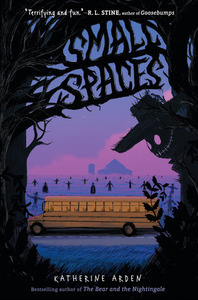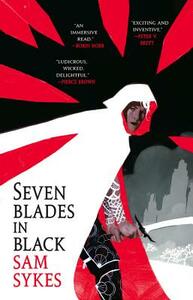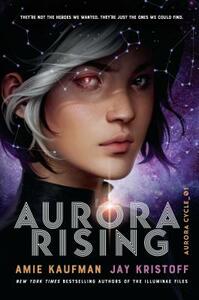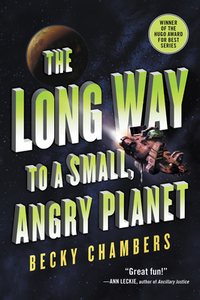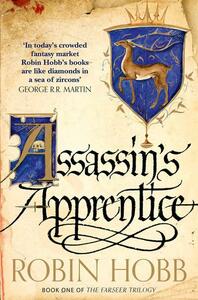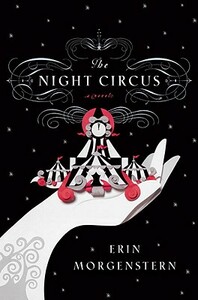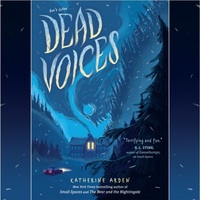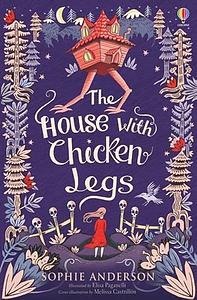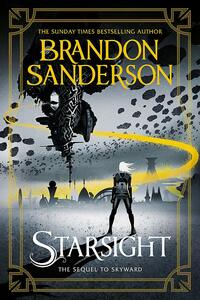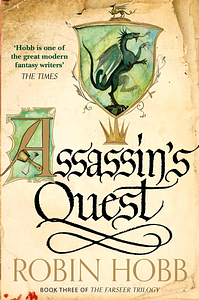You need to sign in or sign up before continuing.
Take a photo of a barcode or cover
kp_hobbitreads's Reviews (686)
Katherine Arden’s Winternight trilogy is one of my favorite series of all time. So when I heard she was writing a Middle Grade series, I knew I was going to have to read it. And, I’m so glad I did. This was utterly delightful.
“Avoid large places. Keep to small.”
Our story follows an 11 year old bookworm named Ollie. Ollie loves books so much that when she sees a woman about to throw a book in the water, she runs up and steals it to keep it safe. Intrigued by why anyone would want to throw a book away, Ollie stays up late reading (#relatable) the story about a woman, the two brothers who loved her, and the “smiling man” who makes deals that may not be worth the cost you have to pay.
The next day, Ollie takes a field trip to a local farm, Smoke Hollow, and discovers that this farm may have a connection to the story she’s been reading. On the way back to school, the bus breaks down and the teacher leaves to get help. The bus driver then warns the students that they better hide, because “they’ll” come for them at night. Only Ollie and two of her classmates leave the bus after that ominous warning and head into the woods.
And that’s when the story takes a turn for the creepy.
“You can’t, she decided, be super scared for very long before you start just laughing or crying.”
This is such a alluringly eerie story; there are sinister looking scarecrows, ghosts, and haunted houses. The story is so engaging that I read it in one sitting. But it’s so much more than a ghost story. It’s a story about loss and grief, and wondering how you can still find happiness and peace in a world without someone who was so integral to both. And its about friendship and family, and the importance of letting people in.
“You might get to know characters in books, Ollie thought, but getting to know a human was an entirely different thing.”
There is a definite focus of grief and depression in this story, and Ollie is dealing with both after loosing someone she loved. And I think this was handled so beautifully and delicately. I loved way Arden explored loss as Ollie learns that those we love never really leave us. And that its okay to keep on living even though we miss them.
Ollie begins the book as a sort of loner, after suffering a tragic loss, she’s closed herself off to the people around her only finding an escape in reading. But, throughout the story she begins to open up again and make friendships – realizing that you shouldn’t be making snap judgments about people, especially based on stereotypes. And that people can surprise you if you let them. I love themes of friendships in middle grade books, and I can’t wait to see more of this trio in the rest of the series.
“How is she the clumsiest person ever on the ground, yet a squirrel when she’s climbing?” muttered Ollie.
Brian grinned. “You’re kind of grumpy most of the time, but when things get bad, you’re the bravest. People can surprise you, Ollie-pop.”
I loved the dichotomy between the heartfelt themes of this story and the creepy plot/setting. I think it was a fantastic way to discuss some really important topics (like loss, grief, depression, bullying, friendship, etc.) in a way that would appeal to middle grade readers. But, this is absolutely a story that adults would love too.
If you are looking for the perfect autumnal middle grade read, you can’t go wrong with this one.
Trigger Warnings: loss of a loved one, depictions of depression and grief
Blog | Instagram | Twitter
“Avoid large places. Keep to small.”
Our story follows an 11 year old bookworm named Ollie. Ollie loves books so much that when she sees a woman about to throw a book in the water, she runs up and steals it to keep it safe. Intrigued by why anyone would want to throw a book away, Ollie stays up late reading (#relatable) the story about a woman, the two brothers who loved her, and the “smiling man” who makes deals that may not be worth the cost you have to pay.
The next day, Ollie takes a field trip to a local farm, Smoke Hollow, and discovers that this farm may have a connection to the story she’s been reading. On the way back to school, the bus breaks down and the teacher leaves to get help. The bus driver then warns the students that they better hide, because “they’ll” come for them at night. Only Ollie and two of her classmates leave the bus after that ominous warning and head into the woods.
And that’s when the story takes a turn for the creepy.
“You can’t, she decided, be super scared for very long before you start just laughing or crying.”
This is such a alluringly eerie story; there are sinister looking scarecrows, ghosts, and haunted houses. The story is so engaging that I read it in one sitting. But it’s so much more than a ghost story. It’s a story about loss and grief, and wondering how you can still find happiness and peace in a world without someone who was so integral to both. And its about friendship and family, and the importance of letting people in.
“You might get to know characters in books, Ollie thought, but getting to know a human was an entirely different thing.”
There is a definite focus of grief and depression in this story, and Ollie is dealing with both after loosing someone she loved. And I think this was handled so beautifully and delicately. I loved way Arden explored loss as Ollie learns that those we love never really leave us. And that its okay to keep on living even though we miss them.
Ollie begins the book as a sort of loner, after suffering a tragic loss, she’s closed herself off to the people around her only finding an escape in reading. But, throughout the story she begins to open up again and make friendships – realizing that you shouldn’t be making snap judgments about people, especially based on stereotypes. And that people can surprise you if you let them. I love themes of friendships in middle grade books, and I can’t wait to see more of this trio in the rest of the series.
“How is she the clumsiest person ever on the ground, yet a squirrel when she’s climbing?” muttered Ollie.
Brian grinned. “You’re kind of grumpy most of the time, but when things get bad, you’re the bravest. People can surprise you, Ollie-pop.”
I loved the dichotomy between the heartfelt themes of this story and the creepy plot/setting. I think it was a fantastic way to discuss some really important topics (like loss, grief, depression, bullying, friendship, etc.) in a way that would appeal to middle grade readers. But, this is absolutely a story that adults would love too.
If you are looking for the perfect autumnal middle grade read, you can’t go wrong with this one.
Trigger Warnings: loss of a loved one, depictions of depression and grief
Blog | Instagram | Twitter
This is my first Sam Sykes book, but it definitely won’t be the last. The novel has great morally gray characters, a unique magic system, and a tale that keeps you turning the page to find out what happens next. And, if that wasn’t enough there’s also a sword named Jeff.
“No one ever gets the death they want,” I replied. “Just the one they deserve.”
Sal the Cacophany was once a highly respected mage, but now she’s a vagrant traveling through The Scar, a ravaged land between two warring empires. But, she was done with all that bullshit. She went to The Scar with a list of names and a magical gun ready to find her vengeance. But, as our story starts Sal has been captured by the Revolution, and she’s awaiting her execution. So now all she’s got left is her story. And she’s going to make sure it’s a damn good one.
“My story,” she said. “What I tell you, you write down. Down to the fucking letter, you write it. You tell it. You remember it. You let it be known what Sal the Cacophony did before she went cackling to hell and left this dark earth to all you dumb motherfuckers.”
The story this novel is telling is so compelling. I mean, who doesn’t love a good ole fashioned quest for revenge? As it unfolds, as we learn who Sal is, why she’s out for blood, and what that means for the people around her. And, I loved the magic system. It requires mages to give something up when they use their power (like their breath or features – or even their ability to move). The connection between the power and the barter always made a twisted kind of sense. The western fantasy setting also really worked for the story. And, Sal rides a giant bird named Congeniality. (Yeah, you read that right.)
“There are others, but the end result is that most Vagrants showing up where you live will ruin your day. Not me, of course. A girl like me tends to ruin your whole week.”
But regardless of how compelling the plot or fascinating the magic system, the real shining stars of this novel are the characters. Sal the Cacophony is an asshole. But, she’s an asshole you can’t help but root for. She’s dealing with past trauma and PTSD. She doesn’t believe she’s worthy or capable of redemption, and she pushes away everyone who tries to get close. And, she’s not great at thinking about the consequences of her actions before she goes and does something stupid.
Liette is a brilliant Freemaker who’s part mechanical genius and part mad scientist. She loves books. And Sal too, despite her better judgement. I like that Liette calls Sal on her bullshit and serves as a moral compass of sorts. And, though I wouldn’t always say their relationship is the healthiest (did I mention Sal’s an asshole?), you still want them to find a way to make it work.
Rounding out our trio is Cavric Proud an officer of the Revolution who has been raised to believe in the righteousness of the cause he serves. But, after meeting Sal, he learns that maybe the world is a little more nuanced that he thought. The dichotomy between Sal’s fatalistic view of the world and Cavric’s idealism causes some strife. But, it also allows for some really great character development and discussions about what we are willing to do to get what we want. And, the way people can find justification for just about anything.
“Because justice isn’t for the victim, is it? It’s not for the girl crying every night or the boy burying his father. It’s for the killer, it’s for the judge, it’s for the shits like you who want to feel like you’re above it all, like forgiving a killer makes up for not being able to protect his victims.” I spat on the floor. “A man kills and you fawn over him and wonder what went wrong. A man dies and you shrug and step over the corpse.”
This is one of my new favorite fantasy books, and I have no doubt that it will make my Best of 2019 list. You should absolutely pick this up. You won’t regret it.
Trigger Warnings: PTSD, discussion of past trauma, abuse, violence/gore, torture, mass murder, violence against children
Blog | Instagram | Twitter
“No one ever gets the death they want,” I replied. “Just the one they deserve.”
Sal the Cacophany was once a highly respected mage, but now she’s a vagrant traveling through The Scar, a ravaged land between two warring empires. But, she was done with all that bullshit. She went to The Scar with a list of names and a magical gun ready to find her vengeance. But, as our story starts Sal has been captured by the Revolution, and she’s awaiting her execution. So now all she’s got left is her story. And she’s going to make sure it’s a damn good one.
“My story,” she said. “What I tell you, you write down. Down to the fucking letter, you write it. You tell it. You remember it. You let it be known what Sal the Cacophony did before she went cackling to hell and left this dark earth to all you dumb motherfuckers.”
The story this novel is telling is so compelling. I mean, who doesn’t love a good ole fashioned quest for revenge? As it unfolds, as we learn who Sal is, why she’s out for blood, and what that means for the people around her. And, I loved the magic system. It requires mages to give something up when they use their power (like their breath or features – or even their ability to move). The connection between the power and the barter always made a twisted kind of sense. The western fantasy setting also really worked for the story. And, Sal rides a giant bird named Congeniality. (Yeah, you read that right.)
“There are others, but the end result is that most Vagrants showing up where you live will ruin your day. Not me, of course. A girl like me tends to ruin your whole week.”
But regardless of how compelling the plot or fascinating the magic system, the real shining stars of this novel are the characters. Sal the Cacophony is an asshole. But, she’s an asshole you can’t help but root for. She’s dealing with past trauma and PTSD. She doesn’t believe she’s worthy or capable of redemption, and she pushes away everyone who tries to get close. And, she’s not great at thinking about the consequences of her actions before she goes and does something stupid.
Liette is a brilliant Freemaker who’s part mechanical genius and part mad scientist. She loves books. And Sal too, despite her better judgement. I like that Liette calls Sal on her bullshit and serves as a moral compass of sorts. And, though I wouldn’t always say their relationship is the healthiest (did I mention Sal’s an asshole?), you still want them to find a way to make it work.
Rounding out our trio is Cavric Proud an officer of the Revolution who has been raised to believe in the righteousness of the cause he serves. But, after meeting Sal, he learns that maybe the world is a little more nuanced that he thought. The dichotomy between Sal’s fatalistic view of the world and Cavric’s idealism causes some strife. But, it also allows for some really great character development and discussions about what we are willing to do to get what we want. And, the way people can find justification for just about anything.
“Because justice isn’t for the victim, is it? It’s not for the girl crying every night or the boy burying his father. It’s for the killer, it’s for the judge, it’s for the shits like you who want to feel like you’re above it all, like forgiving a killer makes up for not being able to protect his victims.” I spat on the floor. “A man kills and you fawn over him and wonder what went wrong. A man dies and you shrug and step over the corpse.”
This is one of my new favorite fantasy books, and I have no doubt that it will make my Best of 2019 list. You should absolutely pick this up. You won’t regret it.
Trigger Warnings: PTSD, discussion of past trauma, abuse, violence/gore, torture, mass murder, violence against children
Blog | Instagram | Twitter
I know a common criticism of Robin Hobb, and this trilogy specifically, is that her narrative tends to meander, and there is a lot of unnecessary exposition. But, I didn’t find that to be the case at all – I was never bored or wished she’d speed things up. I adored this first installment of Fitz’s story, and I can’t wait to see where the world goes from here.
“All events, no matter how earthshaking or bizarre, are diluted within moments of their occurrence by the continuance of the necessary routines of day-to-day living.”
Our story centers on Fitz, the bastard son of King-in-Waiting Chivalry Farseer, who is, at age 6, unceremoniously dumped on his Uncle Verity when his maternal grandfather decides he no longer wants to be responsible for feeding or clothing him. Understandably, the sudden appearance of a royal bastard upsets the careful balance of the royal family. Fitz’s father relinquishes his right to the throne and goes into a self imposed exile, and Verity suddenly finds himself next in line to be King, a position he never wanted.
“If all I had ever done was to be born and discovered, I would have left a mark across all the land for all time. I grew up fatherless and motherless in a court where all recognized me as a catalyst. And a catalyst I become.”
Given over to stable-master Burrich to raise, Fitz becomes a part of life at Buckkeep. But, because of his status as a bastard, he is scorned by most of the nobility, especially his Uncle Regal who goes out of his way to make life miserable for Fitz. As a reaction to this, Fitz finds comfort with his relationship with the animals which is where we first learn of The Wit which is the telepathic connection with animals which can result in a true bond/sharing of minds. However, this magic is reviled as low beast magic, so Fitz must keep it hidden.
As the story progresses Fitz becomes an apprentice to the spymaster Chade who trains him to kill for the King. He learns about Skilling (telepathic communication between humans), poisons, and combat. Fitz eventually gets to put his skills to use as the Six Duchies is attacked by Red-Ship Raiders and find their people being forged which basically means that their souls/memories/identities are wiped away and they are only left with their base instincts.
“When you cut pieces out of the truth to avoid looking like a fool you end up looking like a moron instead.”
I won’t pretend that this isn’t a slower pace story. It is. Hobb takes her time to introduce us to these characters and this world; you truly feel immersed in this story. She spare’s no detail, but she also has a masterful command of language and somehow it all feels like necessary information. This also doesn’t mean that there is no plot – there is. Balancing out the slower placed, slice of life sections are some rather intense plot driven sequences. But, those sequences have more impact because you’ve already connected to these characters so deeply.
When reading this story, you can’t help but to connect with Fitz – you watch him grow, you see his relationships with people and animals, and you watch him struggle with the strands of his life that he has to keep separate. This is a story about love and loyalty and figuring out who is worthy of the trust you place in them.
“It doesn’t have to be that bad,’ Chade said quietly. ‘Most prisons are of our own making. A man makes his own freedom, too.”
This won’t be a book for everyone. But, it was definitely the book for me. I have no doubt that Robin Hobb is going to end up right next to Brandon Sanderson on my favorite Fantasy authors list.
Trigger Warnings: animal abuse, animal death, child abuse
Blog | Instagram | Twitter
“All events, no matter how earthshaking or bizarre, are diluted within moments of their occurrence by the continuance of the necessary routines of day-to-day living.”
Our story centers on Fitz, the bastard son of King-in-Waiting Chivalry Farseer, who is, at age 6, unceremoniously dumped on his Uncle Verity when his maternal grandfather decides he no longer wants to be responsible for feeding or clothing him. Understandably, the sudden appearance of a royal bastard upsets the careful balance of the royal family. Fitz’s father relinquishes his right to the throne and goes into a self imposed exile, and Verity suddenly finds himself next in line to be King, a position he never wanted.
“If all I had ever done was to be born and discovered, I would have left a mark across all the land for all time. I grew up fatherless and motherless in a court where all recognized me as a catalyst. And a catalyst I become.”
Given over to stable-master Burrich to raise, Fitz becomes a part of life at Buckkeep. But, because of his status as a bastard, he is scorned by most of the nobility, especially his Uncle Regal who goes out of his way to make life miserable for Fitz. As a reaction to this, Fitz finds comfort with his relationship with the animals which is where we first learn of The Wit which is the telepathic connection with animals which can result in a true bond/sharing of minds. However, this magic is reviled as low beast magic, so Fitz must keep it hidden.
As the story progresses Fitz becomes an apprentice to the spymaster Chade who trains him to kill for the King. He learns about Skilling (telepathic communication between humans), poisons, and combat. Fitz eventually gets to put his skills to use as the Six Duchies is attacked by Red-Ship Raiders and find their people being forged which basically means that their souls/memories/identities are wiped away and they are only left with their base instincts.
“When you cut pieces out of the truth to avoid looking like a fool you end up looking like a moron instead.”
I won’t pretend that this isn’t a slower pace story. It is. Hobb takes her time to introduce us to these characters and this world; you truly feel immersed in this story. She spare’s no detail, but she also has a masterful command of language and somehow it all feels like necessary information. This also doesn’t mean that there is no plot – there is. Balancing out the slower placed, slice of life sections are some rather intense plot driven sequences. But, those sequences have more impact because you’ve already connected to these characters so deeply.
When reading this story, you can’t help but to connect with Fitz – you watch him grow, you see his relationships with people and animals, and you watch him struggle with the strands of his life that he has to keep separate. This is a story about love and loyalty and figuring out who is worthy of the trust you place in them.
“It doesn’t have to be that bad,’ Chade said quietly. ‘Most prisons are of our own making. A man makes his own freedom, too.”
This won’t be a book for everyone. But, it was definitely the book for me. I have no doubt that Robin Hobb is going to end up right next to Brandon Sanderson on my favorite Fantasy authors list.
Trigger Warnings: animal abuse, animal death, child abuse
Blog | Instagram | Twitter
Now that Erin Morgenstern has published her second novel, I figured it’s as good a time as any to finally write my review of The Night Circus. I’ve been putting off writing this review since I first read this book 3 years ago because I didn’t think I could do this book justice or accurately express what this book means to me. I still don’t. But, I’m going to give it a try anyway.
“The circus arrives without warning. No announcements preceded it, no paper notices on downtown posts and billboards, no mentions or advertisements in local newspapers. It is simply there, when yesterday it was not.”
I’m not going to give a highly detailed plot synopsis because I think this is a book that needs to experienced. The less you know going into it, the more you can let the story unfold around you. And find yourself transported to a world of striped tents and acrobatic displays, a marvelous black and white clock, and enchanting feats of magic and illusion.
Here is what you need to know: The Night Circus is the story of two young magicians, Celia and Marco, who are raised and trained to compete in a magical competition. What they don’t know is that the competition that will only end when one of them dies. Along the way they fall deeply in love. But, they still find themselves trapped in a game that they have very little control over, and one that holds the fate of all those involved with the circus in its grasp.
“I would have written you, myself, if I could put down in words everything I want to say to you. A sea of ink would not be enough.'”
“But you built me dreams instead.”
I think its important to note that while this story centers around a magical competition – it’s not what you might initially think of. There are no rules, and there is no offensive magic. Celia and Marco aren’t dueling face to face, but rather are presenting their skills for the circus patrons to prove they are the more talented magician. It’s told in a non-linear format, and from multiple POVs. While it can be a little jarring at first, once you get your bearings, the story is all the better for it. And, when the timelines come together and you see what Morgenstern was working towards it’s absolutely worth it. The Night Circus is a character driven story – and make no mistake, the circus is a character in its own right.
While Celia and Marco are the central story, there is so much more to The Night Circus than that. You get to see Le Cirque des Rêves from it’s inception; created at one of Chandresh Christophe Lefèvre’s midnight dinners. You see the impact the circus has on its creators, and the impact they have on it in return.
You follow Widget and Poppet (the only two children that are a part of the circus) and their burgeoning friendship with Bailey (a boy who is looking for something, even if he doesn’t quite know what that is). And, of course, there is Herr Thiessen, the clock maker and letter writer. His love for the circus matches my own. And if it were real, I’d be a Rêveur too.
“I am tired of trying to hold things together that cannot be held. Trying to control what cannot be controlled. I am tired of denying myself what I want for fear of breaking things I cannot fix. They will break no matter what we do.”
So now that you know what its about, why should you read it?
Because it is undoubtedly the most beautifully written book I’ve ever read in my entire life. Morgenstern’s writing is lush and atmospheric and lyrical. You feel as if you are there with these characters as they navigate this competition and this world. It truly feels like an immersive experience.
This is a love story to be sure – but it is one of stolen glances and the brushing of hands. It’s also a story about finding your place in the world. It’s about struggling against the limitations placed on you by other people, and what it takes to chart a path for yourself. This is a story about a beautiful and magical circus. But, its also a story about people and the choices they make – for good or for ill.
“You may tell a tale that takes up residence in someone’s soul, becomes their blood and self and purpose. That tale will move them and drive them and who knows that they might do because of it, because of your words. That is your role, your gift.”
There are stories that you read because they’re fun; they make you laugh, or cry, or provide an escape from the realities of the world. Whether you read again and again or you only visit once, you remember them fondly. But, at the end of the day they are just stories.
And, then there are books that make you really feel some something. The words and the characters speak to you in a way that other books haven’t. Maybe they tell you a little something about yourself or have you look at the world in a different way. The story takes up residence in your heart. The characters feel like old friends. And, revisiting the world feels like going home.
This is one of those books.
Trigger Warnings: child abuse, self-harm, suicide
Blog | Instagram | Twitter
“The circus arrives without warning. No announcements preceded it, no paper notices on downtown posts and billboards, no mentions or advertisements in local newspapers. It is simply there, when yesterday it was not.”
I’m not going to give a highly detailed plot synopsis because I think this is a book that needs to experienced. The less you know going into it, the more you can let the story unfold around you. And find yourself transported to a world of striped tents and acrobatic displays, a marvelous black and white clock, and enchanting feats of magic and illusion.
Here is what you need to know: The Night Circus is the story of two young magicians, Celia and Marco, who are raised and trained to compete in a magical competition. What they don’t know is that the competition that will only end when one of them dies. Along the way they fall deeply in love. But, they still find themselves trapped in a game that they have very little control over, and one that holds the fate of all those involved with the circus in its grasp.
“I would have written you, myself, if I could put down in words everything I want to say to you. A sea of ink would not be enough.'”
“But you built me dreams instead.”
I think its important to note that while this story centers around a magical competition – it’s not what you might initially think of. There are no rules, and there is no offensive magic. Celia and Marco aren’t dueling face to face, but rather are presenting their skills for the circus patrons to prove they are the more talented magician. It’s told in a non-linear format, and from multiple POVs. While it can be a little jarring at first, once you get your bearings, the story is all the better for it. And, when the timelines come together and you see what Morgenstern was working towards it’s absolutely worth it. The Night Circus is a character driven story – and make no mistake, the circus is a character in its own right.
While Celia and Marco are the central story, there is so much more to The Night Circus than that. You get to see Le Cirque des Rêves from it’s inception; created at one of Chandresh Christophe Lefèvre’s midnight dinners. You see the impact the circus has on its creators, and the impact they have on it in return.
You follow Widget and Poppet (the only two children that are a part of the circus) and their burgeoning friendship with Bailey (a boy who is looking for something, even if he doesn’t quite know what that is). And, of course, there is Herr Thiessen, the clock maker and letter writer. His love for the circus matches my own. And if it were real, I’d be a Rêveur too.
“I am tired of trying to hold things together that cannot be held. Trying to control what cannot be controlled. I am tired of denying myself what I want for fear of breaking things I cannot fix. They will break no matter what we do.”
So now that you know what its about, why should you read it?
Because it is undoubtedly the most beautifully written book I’ve ever read in my entire life. Morgenstern’s writing is lush and atmospheric and lyrical. You feel as if you are there with these characters as they navigate this competition and this world. It truly feels like an immersive experience.
This is a love story to be sure – but it is one of stolen glances and the brushing of hands. It’s also a story about finding your place in the world. It’s about struggling against the limitations placed on you by other people, and what it takes to chart a path for yourself. This is a story about a beautiful and magical circus. But, its also a story about people and the choices they make – for good or for ill.
“You may tell a tale that takes up residence in someone’s soul, becomes their blood and self and purpose. That tale will move them and drive them and who knows that they might do because of it, because of your words. That is your role, your gift.”
There are stories that you read because they’re fun; they make you laugh, or cry, or provide an escape from the realities of the world. Whether you read again and again or you only visit once, you remember them fondly. But, at the end of the day they are just stories.
And, then there are books that make you really feel some something. The words and the characters speak to you in a way that other books haven’t. Maybe they tell you a little something about yourself or have you look at the world in a different way. The story takes up residence in your heart. The characters feel like old friends. And, revisiting the world feels like going home.
This is one of those books.
Trigger Warnings: child abuse, self-harm, suicide
Blog | Instagram | Twitter
Dead Voices is the second book in Katherine Arden’s middle grade horror/paranormal series, and I loved it just as much as I loved the first one.
"Since October, none of them had liked being alone in the dark. It wasn’t that they were afraid, exactly. But they had learned that bad things could happen to you. At night. Alone. In the dark."
This installment follows friends Ollie, Coco, and Brian who travel with their parents to Mount Hemlock Resort to ski over winter break. However, a bad snow storm causes a power outage so the trio is stuck inside camping by the fire to stay warm. On their first morning at the resort Mr. Vorland, a ghost hunter, shows up to investigate rumors of haunting at the lodge. Still reeling from their encounter with the Smiling Man in the Fall, Ollie Coco, and Brian are hesitant to trust a stranger. Especially when Ollie’s watching gives them a warning: “BEWARE”.
“I believe in memory. I believe in remembering someone you love so well that it becomes kind of like a ghost. You remember someone so hard that it feels like they’re in the next room, just around the corner, that they could walk in any minute.”
Dead Voices is a good ole fashioned ghost story, and it was a joy to read. It was equal parts humorous and chilling, and it’s perfect to read when its cold outside. I love the friendship between the trio; they talk about their issues and work through their problems together, and they’re always supportive each other. I especially love seeing strong female friendships in middle grade. As with the first book, there are themes of grief and loss, but also some hints about moving forward. And, this installment also deals with the resulting trauma from their experiences in the first book. I really liked that it wasn’t glossed over like it didn’t effect them. This story just has to much heart, and I can’t wait to see where the trio goes next.
Blog | Instagram | Twitter
"Since October, none of them had liked being alone in the dark. It wasn’t that they were afraid, exactly. But they had learned that bad things could happen to you. At night. Alone. In the dark."
This installment follows friends Ollie, Coco, and Brian who travel with their parents to Mount Hemlock Resort to ski over winter break. However, a bad snow storm causes a power outage so the trio is stuck inside camping by the fire to stay warm. On their first morning at the resort Mr. Vorland, a ghost hunter, shows up to investigate rumors of haunting at the lodge. Still reeling from their encounter with the Smiling Man in the Fall, Ollie Coco, and Brian are hesitant to trust a stranger. Especially when Ollie’s watching gives them a warning: “BEWARE”.
“I believe in memory. I believe in remembering someone you love so well that it becomes kind of like a ghost. You remember someone so hard that it feels like they’re in the next room, just around the corner, that they could walk in any minute.”
Dead Voices is a good ole fashioned ghost story, and it was a joy to read. It was equal parts humorous and chilling, and it’s perfect to read when its cold outside. I love the friendship between the trio; they talk about their issues and work through their problems together, and they’re always supportive each other. I especially love seeing strong female friendships in middle grade. As with the first book, there are themes of grief and loss, but also some hints about moving forward. And, this installment also deals with the resulting trauma from their experiences in the first book. I really liked that it wasn’t glossed over like it didn’t effect them. This story just has to much heart, and I can’t wait to see where the trio goes next.
Blog | Instagram | Twitter
The House with Chicken Legs is a quaint retelling of the Baba Yaga myth, and it it has definitely made me want to pick up more of Sophie Anderson’s work.
“'I don’t want to be a Guardian of The Gate.' My voice is tiny, wavering. I clear my throat and try to speak more firmly. 'I don’t want the dead’s lives to add to mine. I just want one life. My life. And I want to be able to choose what to do with it.'”
Marinka just wants to be a normal 12 year old girl. She wants to live in one place. Make a real friend. And have the ability to choose what she wants to do with her life. Unfortunately for Marinka, her house has chicken legs that allows it to travel all over the world on a whim. And her grandmother is a Yaga, a guardian who guides souls to the afterlife upon their death. When Marinka seizes the opportunity to make a real friend, despite warnings from her grandmother, she sets off a chain of events she didn’t expect.
“It’s not how long a life, but how sweet a life that counts.”
I love Marinka’s character development in this story. She’s a little selfish and she doesn’t always think before she acts, but she’s 12. That’s normal. And, throughout this story she learns so much about herself and the world she inhabits. This story is filled with so much hope and adventure. While on its surface its about a girl growing up in a magical house and being trained by her grandmother to take over the family business, its also about a girl fighting against the path that’s being laid out for her and feeling trapped by a life she didn’t choose. It’s about a young girl dealing with grief and loneliness, and having to deal with the consequences of your choices and making sacrifices for the ones you love. This story has found families, adorable animal companions, friendship, and love. If you’re looking for a heartwarming and whimsical middle grade, pick this one up.
Blog | Instagram | Twitter
“'I don’t want to be a Guardian of The Gate.' My voice is tiny, wavering. I clear my throat and try to speak more firmly. 'I don’t want the dead’s lives to add to mine. I just want one life. My life. And I want to be able to choose what to do with it.'”
Marinka just wants to be a normal 12 year old girl. She wants to live in one place. Make a real friend. And have the ability to choose what she wants to do with her life. Unfortunately for Marinka, her house has chicken legs that allows it to travel all over the world on a whim. And her grandmother is a Yaga, a guardian who guides souls to the afterlife upon their death. When Marinka seizes the opportunity to make a real friend, despite warnings from her grandmother, she sets off a chain of events she didn’t expect.
“It’s not how long a life, but how sweet a life that counts.”
I love Marinka’s character development in this story. She’s a little selfish and she doesn’t always think before she acts, but she’s 12. That’s normal. And, throughout this story she learns so much about herself and the world she inhabits. This story is filled with so much hope and adventure. While on its surface its about a girl growing up in a magical house and being trained by her grandmother to take over the family business, its also about a girl fighting against the path that’s being laid out for her and feeling trapped by a life she didn’t choose. It’s about a young girl dealing with grief and loneliness, and having to deal with the consequences of your choices and making sacrifices for the ones you love. This story has found families, adorable animal companions, friendship, and love. If you’re looking for a heartwarming and whimsical middle grade, pick this one up.
Blog | Instagram | Twitter
So I don’t know how Sanderson continues to shock and amaze me with his plot twists, but he does. Every. Single. Time. Starsight is a brilliant book from start to finish, and I can’t wait to see where the story takes us next.
“A hero does not choose her trials. She steps into the darkness. Then she faces what comes next.”
Starsight is the second book in a YA Science Fiction/Space Opera series about a planet full of humans who are stranded and constantly under threat of attack from alien ships. Our main character Spensa is a wannabe pilot, who also happens to be the daughter of the most famous deserter in DDF history. Which is especially bad given that the people of Detritus value courage and bravery above all else. The first book in the series follows Spensa’s attempts to join the flight school and find her place among her peers. And, in the second we see Spensa grappling with the implications of her abilities and hoping find a way to finally allow her people to escape Detritus and life spent constantly at war.
“So, you’re worried about what?” M-Bot said. “That your shadow might take your place?” “No,” I whispered. “I worry that I’m already the shadow.”
If you loved Skyward, I think you’ll love Starsight too. It has the same feel, but it ups the stakes considerably. Spensa is still a hothead with an impulse control issue, but she’s trying. Her motivations are a sincere desire to help her people. And maybe, prove herself too. It was nice to see that the lessons she learned in the first book have stuck with her, but that she still has room to grow. Her arc continues to feel natural and authentic. And Sanderson does a fantastic job of exploring this expanded world/galaxy through Spensa’s eyes and thus taking us along or the ride. It allowed things to be explained and revelations to happen slowly, but still pack a big punch.
I loved the discussions about what it means to be alive and to have humanity. M-Bot is constantly grappling with his own humanity and aliveness. Is he just a machine? A computer program? A person? Is he actually making his own choices or just following the dictates of his coding? We learn about several new alien species in this second book, and I really liked the ideological questions that raised.
“Not that there’s anything wrong with humans. I find their frail, emotionally unstable, irrational natures quite endearing.”
This is certainly an action packed space opera, but it is also the story of a young girl who is just trying to figure out the world. It’s about people making the best choices they can with the information they have, and dealing with the consequences of the choices made by those who came before them. It’s about recognizing our inherent prejudices and the dangers of being instantly suspicion of those who are different. And realizing that species/races are not a monolith. All of these themes are woven in with Spensa’s and M-Bot’s character growths and the plot so seamlessly that, while they are incredibility relevant to the current political climate, they didn’t feel heavy handed. They just feel like a natural progression of the story.
“That’s what war is,” Cobb told me. “A bunch of sorry, desperate fools on both sides, just trying to stay alive. That’s the part that those stories you love leave out, isn’t it? It’s always more convenient when you can fight a dragon. Something you don’t have to worry you’ll start caring about.”
Starsight is easily the best sci-fi book I’ve read this year. It’s got intense fight sequences, political maneuverings, complex relationship dynamics, and an ending that left me reeling.
Blog | Instagram | Twitter
“A hero does not choose her trials. She steps into the darkness. Then she faces what comes next.”
Starsight is the second book in a YA Science Fiction/Space Opera series about a planet full of humans who are stranded and constantly under threat of attack from alien ships. Our main character Spensa is a wannabe pilot, who also happens to be the daughter of the most famous deserter in DDF history. Which is especially bad given that the people of Detritus value courage and bravery above all else. The first book in the series follows Spensa’s attempts to join the flight school and find her place among her peers. And, in the second we see Spensa grappling with the implications of her abilities and hoping find a way to finally allow her people to escape Detritus and life spent constantly at war.
“So, you’re worried about what?” M-Bot said. “That your shadow might take your place?” “No,” I whispered. “I worry that I’m already the shadow.”
If you loved Skyward, I think you’ll love Starsight too. It has the same feel, but it ups the stakes considerably. Spensa is still a hothead with an impulse control issue, but she’s trying. Her motivations are a sincere desire to help her people. And maybe, prove herself too. It was nice to see that the lessons she learned in the first book have stuck with her, but that she still has room to grow. Her arc continues to feel natural and authentic. And Sanderson does a fantastic job of exploring this expanded world/galaxy through Spensa’s eyes and thus taking us along or the ride. It allowed things to be explained and revelations to happen slowly, but still pack a big punch.
I loved the discussions about what it means to be alive and to have humanity. M-Bot is constantly grappling with his own humanity and aliveness. Is he just a machine? A computer program? A person? Is he actually making his own choices or just following the dictates of his coding? We learn about several new alien species in this second book, and I really liked the ideological questions that raised.
“Not that there’s anything wrong with humans. I find their frail, emotionally unstable, irrational natures quite endearing.”
This is certainly an action packed space opera, but it is also the story of a young girl who is just trying to figure out the world. It’s about people making the best choices they can with the information they have, and dealing with the consequences of the choices made by those who came before them. It’s about recognizing our inherent prejudices and the dangers of being instantly suspicion of those who are different. And realizing that species/races are not a monolith. All of these themes are woven in with Spensa’s and M-Bot’s character growths and the plot so seamlessly that, while they are incredibility relevant to the current political climate, they didn’t feel heavy handed. They just feel like a natural progression of the story.
“That’s what war is,” Cobb told me. “A bunch of sorry, desperate fools on both sides, just trying to stay alive. That’s the part that those stories you love leave out, isn’t it? It’s always more convenient when you can fight a dragon. Something you don’t have to worry you’ll start caring about.”
Starsight is easily the best sci-fi book I’ve read this year. It’s got intense fight sequences, political maneuverings, complex relationship dynamics, and an ending that left me reeling.
Blog | Instagram | Twitter
